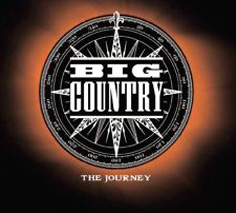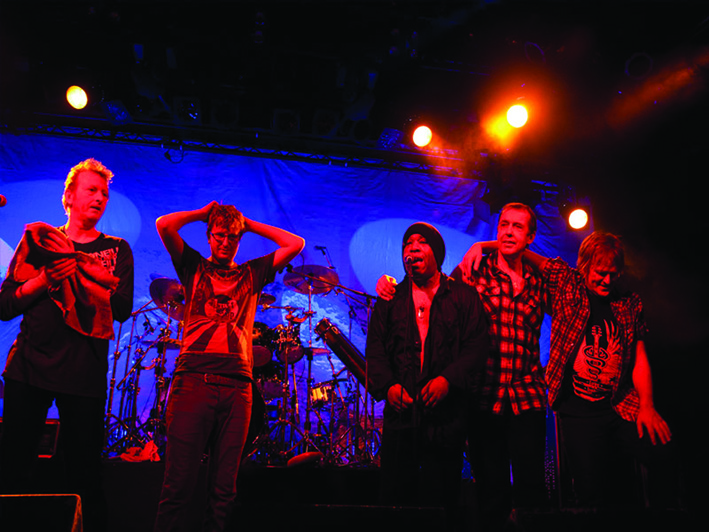|
|
 |
||||||
 |
||||||
 |
||||||
|
Die aktuelle Besetzung der Band hat sich nach der Wiedergründung von BIG COUNTRY um den Sohn des Gitarristen Bruce Watson, Jamie Watson, und den ehemaligen Frontmann der walisischen Band THE ALARM, Mike Peters, erweitert. Der 1958 geborene Peters singt und spielt akusitische Gitarre und bezeichnet sich selbst als alten Fan der Band. Die Liveauftritte der neuen Band zeigen den Einfluß des zurückgewonnenen Produzenten der ersten beiden Alben, Steve Lillywhite und lassen einiges erwarten! ......With their ringing, bagpipe-like guitars and the anthemic songs of frontman Stuart Adamson, Scotland's Big Country emerged as one of the most distinctive and promising new rock bands of the early '80s, scoring a major hit with their debut album The Crossing. Though the group's critical and commercial fortunes dimmed in the years to follow, they nevertheless outlasted virtually all of their contemporaries, releasing new material into the next century. The England- born Adamson formed Big Country in mid-1981 following his exit from the Scottish punk quartet the Skids, enlisting childhood friend Bruce Watson on second guitar; Clive Parker and brothers Pete and Alan Wishart completed the original lineup, but were soon replaced by bassist Tony Butler and drummer Mark Brzezicki. Signing to Polygram's Mercury imprint, the band issued its debut single, "Harvest Home" in the fall of 1982; a series of opening dates on the Jam's farewell tour increased Big Country's visibility exponentially, and the follow- up "Fields of Fire" cracked the U.K. Top Ten. |
||||||
|
Big Country was a rock band from Dunfermline, Fife, Scotland, popular in the early to mid-1980s but still releasing material for a cult following. Composed of Stuart Adamson (formerly of The Skids, vocals /guitar /keyboards), Bruce Watson (guitar /mandolin /sitar /vocals), Tony Butler (bass guitar /vocals ) and Mark Brzezicki (drums /percussion /vocals) though a variety of other drummers have been in the band throughout their long career, including Simon Phillips. Prior to the recruitment of Butler and Brzezicki, an early incarnation of Big Country was a five-piece band in 1981 and it featured Pete Wishart, later of Runrig and now an SNP MP, on keyboards. Although the band's music drew from Scottish traditional music, none of its members was born in Scotland. Adamson grew up in Dunfermline though, and as such, his Scottish accent was genuine. Their first single was "Harvest Home", recorded and released in 1982. It was a modest success, reaching #91 on the UK Singles Chart . Their next single was 1983's "Fields of Fire", which reached the UK 's Top Ten and was rapidly followed by the album The Crossing . The album was a hit in the United States , powered by "In a Big Country ", their only U.S. Top 40 hit single. The Crossing sold over a million copies in the UK and obtained gold record status (sales of over 500,000) in the U.S. The band also performed on both the Grammys and Saturday Night Live. The song featured heavily engineered guitar playing, strongly reminiscent of bagpipes; Adamson and fellow guitarist, Watson, achieved this through the use of the MXR Pitch Transposer 129 Guitar Effect. Also contributing to the band's unique sound was their early virtuoso use of the e-bow, a device which allows a guitar to sound more like strings or synthesizer. The band released the non-LP extended play single "Wonderland " in 1984 while undergoing a lengthy worldwide tour. The song, considered by some critics to be one of their finest, was a Top Ten hit (#8) in the UK singles chart but despite heavy airplay and a positive critical response, was a comparative flop in the U.S., reaching only #86 on the Billboard Hot 100. It was the last single by the band to make a U.S. chart appearance. Their second album Steeltown (1984) was a hit as soon as it was released, entering the UK Albums Chart at number one. The album featured three UK top 30 hit singles, and received considerable critical acclaim on both sides of the Atlantic, but like Wonderland (and, in fact, all subsequent releases) it was a commercial disappointment in the U.S, peaking at #70 on the Billboard album charts. Throughout 1984 and 1985, the band toured the UK, Europe, and, to a lesser extent, the U.S., both as headliners themselves and in support of such artists as Queen and Roger Daltrey. They also recorded prolifically, and provided the musical score to a Scottish independent film, 'Restless Natives' (1985), which was not released on CD until years later on the band's Restless Natives and Rarities (1998) collection. 1986's The Seer, the band's third album, was another big success in the UK, peaking at Number 2. It produced three further top 30 singles, including the Irish number one hit "Look Away ", which would also prove to be the band's biggest hit in the U.K., peaking at #7. Kate Bush provided backing vocals on the album's title track, and as was the norm for the band at the time, the album received good reviews from the music press. In the U.S., The Seer sold a little bit better than Steeltown, reaching #59 on the Billboard charts. In what some critics felt was an apparent attempt to regain their dwindling U.S. following, Big Country used producer Peter Wolf for their next album, Peace in Our Time (1988), which was recorded in Los Angeles, California. The result was very different from the previous singles and albums, and, in "Broken Heart (13 Valleys)" contained the song which Stuart Adamson claimed to be his favorite of all time. Despite this it was not well received by most critics and fans. One reviewer noted that it was the group's "least representative and least interesting album". It sold poorly. No Place Like Home (1991) not only effectively killed off the band's commercial hopes in the US, it nearly broke up the band. Drummer Mark Brzezicki returned to the studio as a session drummer after leaving the band. The album found the band trying to reinvent themselves and shift away from their '80s image. It was not a commercial success and was not released in America, although two re-recorded tracks showed up on 1993's The Buffalo Skinners. In 1991, the band was dropped by Phonogram, the label that had released all of their material for ten years. After that, Big Country became a minor act, popping up in the lower echelons of the charts in the UK and Europe with the release of every subsequent album. Only one of these, 1993's The Buffalo Skinners, received a major label release (via Chrysalis Records ); it seemed a return to form of sorts for the band, and obtained a surprisingly enthusiastic critical response. But its sales were meagre and, in retrospect, it can be seen as Big Country's last, lost chance to regain a mass audience. Regardless, the band retained an intensely devoted cult following, as evidenced by their deceptively large post-1990 discography, which consists mostly of live concert recordings and singles/rarities collections. Throughout the 1990s, Big Country became a popular 'opening act', supporting such bands as Rolling Stones and The Who; Roger Daltrey reportedly uttered on numerous occasions that he'd 'love to steal their rhythm section!' Of growing concern, however, was the mental and emotional health of lead singer Adamson, who reportedly had struggled with alcoholism for several years. Adamson split with his first wife, who later spoke to Scottish and English tabloids about his heavy drinking. He moved to Nashville in the mid 1990s where he took up residence and married a hairdresser. While in Nashville, he met noted artist Marcus Hummon and released an acclaimed studio album with him under the moniker The Raphaels. In 1995 Big Country released another album Why the Long Face? . 1999 saw the release of Big Country's eighth and final studio album, Driving to Damascus (titled in its slightly different, augmented U.S. release John Wayne's Dream). Adamson said publicly that he was disappointed that the album did not fare better on the charts, which led to depression. Later that year, he disappeared for a while before resurfacing, stating that he had just needed some time off. Adamson returned for the band's 'Final Fling' farewell tour, culminating in a sold-out concert at Glasgow 's Barrowland Ballroom on 31 May 2000. Although that marked the end of Big Country as a touring band, they were always adamant that they would appear together again. They played what turned out to be their last gig in Kuala Lumpur , Malaysia , in October that year. In November 2001, Adamson disappeared again. Numerous appeals were put on the Big Country website asking for Adamson to call home and speak to anyone in the band, the management company, or his ex-wife. The website also requested that any fans who might have been 'harboring' the singer to contact the management company and alert them to his whereabouts. Mark Brzezicki and Tony Butler had indicated they were concerned but the reason Big Country had lasted so long was they stayed out of one another's personal lives, and both later noted they were unaware of the extent of Adamson's problems. He was found dead in a room at the Best Western Plaza Hotel in Honolulu , Hawaii on December 16 , 2001. The official autopsy revealed that he had hanged himself. At the time of death he had a blood-alcohol content of 0.279%. A memorial to Adamson was held at Dunfermline's Carnegie Hall in January 2002, followed by a tribute concert at the Barrowlands in May. It brought together the remaining members of both Big Country and The Skids ; Adamson's teenage children, Callum and Kirsten; as well as Steve Harley, Runrig, Simon Townsend, Midge Ure and Bill Nelson |
|
Big Country includes: Stuart Adamson (Vocals, Guitar, E-bow, Piano); Bruce Watson (Guitar, E-bow, Background Vocals); Tony Butler (Bass, Background Vocals); Mark Brzezicki (Drums, Percussion, Background Vocals). |
|
[Big-Country.de] [The Band] [BC over Germany] [Über diese Seite] [Discografie] [My Collection] [Links] [News & Infos] [Videos] [THE SEER] [SHOP] [Kontakt] [Fanmeetings] |
 |